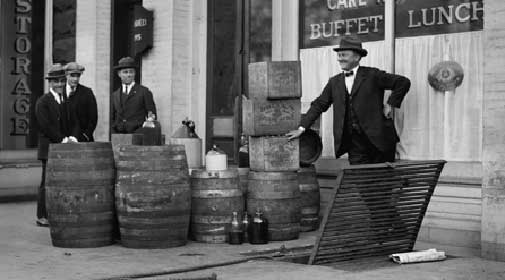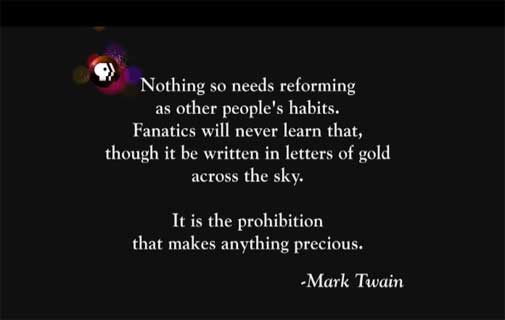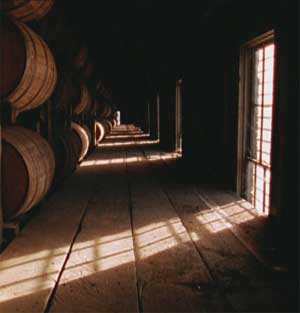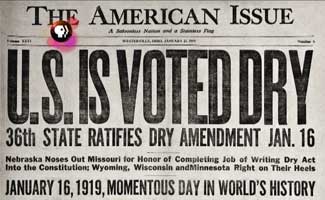
Two months ago, while on the Television Critics Association press tour, I wrote about the then-upcoming documentary series
Prohibition, co-directed for PBS by Ken Burns and Lynn Novick. (You can read that story
HERE.)
However, I saved a fuller review of the show, and excerpts from a private chat with Burns and Novick before their TCA press conference, until now, as Prohibition premieres Oct. 2-4 at 8 p.m. ET (as always with PBS, check local listings)...
Prohibition is another wonderful, wonder-filled work from Burns and company. Despite its topic, it's anything but dry.
(To hear, or read, my NPR Fresh Air with Terry Gross review of Prohibition, as well as of Showtime's Dexter and Homeland, click HERE. To read our resident business history professor, David Sicilia's, very informed take on Prohibition, click HERE. And to read a review by TVWW contributor Eric Gould in his Cold Light Reader column, click HERE.)
Prohibition, at almost six hours spread over three nights, is the latest Burns entry -- and the latest Burns success -- in a string of nonfiction programs that stretch back to Brooklyn Bridge exactly 30 years ago, and stretch ahead for several years as well.
Next up from Burns' Florentine Films: PBS documentaries on the Dust Bowl; the Central Park Five case about the defendants wrongly accused of raping and brutalizing a female jogger (on that most recent of real-life studies, Burns is working with his daughter Sarah, who wrote the book about the case); a history of the Roosevelts; a biography of Jackie Robinson; and, following up on The Civil War and The War, a documentary series about Vietnam.
Notice how many of those topics overlap, or echo, themes and personalities present in previous Burns documentaries -- the subject of race, almost always, chief among all. There's lots of common ground, and Burns is unafraid to walk and explore it again and again. I told him I now anticipate certain notes to appear in his works, and wait for them, like Alfred Hitchcock cameos in his films.
I wondered, for example, whether Mark Twain, the subject of a previous Burns biography, would show up in Prohibition. It took all of four seconds ("If that," Burns joked), as a Twain quote opens the entire series:

"How great a comment is that?" Burns asked, when I mentioned it. "You almost have to pack up your tent and go home."
Instead, co-directors Burns and Novick, and writer Geoffrey C. Ward, roll up their sleeves and get started.
It's impressive, but by no means surprising, that the entire first installment of Prohibition -- one-third of the running time -- takes place before the Volstead Act and the 18th Amendment came into being. Burns has always been obsessed with context, and with taking time to find smaller stories that illuminate and explain the larger ones.
In this case, he and Novick and Ward are as interested in "everything beyond Al Capone, Model Ts and machine guns" as they are in the stories and conflicts being dramatized in HBO's Boardwalk Empire. Not at all coincidentally, one of the expert historians consulted for Boardwalk Empire, historian Daniel Okrent (author of Last Call: The Rise and Fall of Prohibition), is a major voice in this PBS Prohibition series as well.
He and others bring to life, and comment upon, one gripping human story after another -- Carrie Nation, Mabel Walker Willebrandt, and George Remus, just to name a few.
When I said to Burns that I thought the story of George Remus was so amazing, he was his own feature film, Burns' voice jumped to a higher, more excited register.
"Yes, exactly!" he shouted. "Absolutely!"

Paul Giamatti provides the voice of Remus, when quotes of his are read. Other actors lending their voices to Prohibition include Blythe Danner, Patricia Clarkson, Tom Hanks, Samuel L. Jackson, John Lithgow and Sam Waterston. Watch enough Burns documentaries, and you'll recognize most of them as repeat contributors.
Another voice running through Prohibition, but one who also is onscreen, is that of author and journalist Pete Hamill, whose remarks and observations are so telling, so honest and so incisive, Novick calls him the documentary's "heart and the soul and the brain, all together."
Through it all, Burns and Novick rely on what could almost be considered, by now, members of their personal repertory company. Peter Coyote, for example, doesn't narrate every Burns project, but enough of them to make you warm to the sound of his voice when you hear it again here. (Even more so than when he lends his voice to, say, the iPad 2 ads.) And Wynton Marsalis, too, composes and records some terrific music for the soundtrack, complementing well-selected period recordings and contributions by others.
"it's always, for us, the very simple thing of what works," Burns said, referring to both the images and the music in Prohibition. "The music is a more interesting question, and we're excited about it.
"It's alive and vibrant, and very much contemporary with the period, but also alive and vibrant with new music that's composed by Wynton and a guy we've been working with, David Cieri. With Wynton, we have forged a kind of kinship with him since Jazz. And where appropriate, we don't want to leave home without him."

Finally, I asked about the parallels to today's society -- parallels that were obvious but, for the most part, intentionally unspoken.
"We wanted to let people make their own conclusions from the film," Novick explained. "Yes, there are parallels, and there also are differences, and we sort of wanted to leave that for the audience to figure out."
But on one particular issue, comparing Prohibition to today's war on drugs and the calls for decriminalization, Burns was happy to outline the distinctions as he sees them.
"If you think about it," he said, "human beings have been drinking alcohol, either fermented or distilled, for millennia. It's been an across-the-board, cultural phenomenon. Drug use is a sub-cultural phenomenon.
"With Prohibition, we're talking about an event in American history in which, because of a very serious social problem, we imposed the solution on 100 percent of the people.
Drug use is a very serious problem which we're now proposing to follow the model of Prohibition, and impose the access and the use for everybody. There's a huge, big difference. You can drive a truck through that difference."